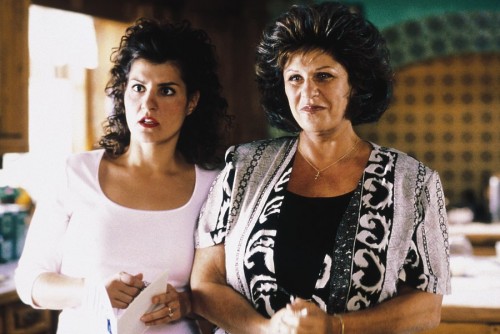
In the movie “My Big Fat Greek Wedding” the main character’s mom mentioned something that stuck with me. It went something like this:
“The man may be the head of the house, but the woman is the neck.”
I gotta say… I love that. Never before or since have I heard a better illustration of how a man and wife work together to lead their family. It’s the perfect blend between traditional values and common sense.
In my marriage my wife is more than happy to leave the leadership to me… that’s because she knows I truly have her and the kid’s best interests in mind. I don’t make decisions selfishly. I’m no Giaus Baltar. That being said, I don’t make a single family decision without the complete support and agreement of my wife. We are a team. If we don’t agree, it’s not a right move for us. I trust her even when I’m not crazy about our disagreement on a particular move. In that way she is the neck to my head. We are inseparable. She gives direction and support.
In so many marriages I see spouses struggling with one another over power… over who will lead. Wives unable to trust their husbands and husbands unable to make selfless choices. Neither are able to fulfill their roles in the family because they’re out of sync, each trying to make up for the shortcomings of the other.
Secretly it’s not about power though… it’s about self-preservation and the avoidance of pain, which looks outwardly like a lack of trust and a grab for power. When couples are open and honest with one another about their own fears, they can start working for one another instead of against.
Here are some tips that have worked for Jenn and I when it comes to trusting one another’s roles in our marriage.
1. Figure out what your issues are.
Why are you unable to trust one another? What happened in your past (probably early childhood) that have caused you to make vows to protect yourself.
2. Share those issues, fears and shortcomings openly with your spouse.
Chances are that all of your issues are bumping into your spouses issues. Each of you pushing one another’s buttons unintentionally. This is not a time to be defensive. It’s a time to share your feelings and hear the pain behind them. If someone feels more strongly about something than you can understand… it’s because that’s how big of a deal it is to them.
3. Realize that your spouse is not your enemy or competition. They are your partner, friend and teammate.
If one of you have issues… then you both do. It’s not about one person working it out… it’s about both of you working on your issues together. You are more than a team… you are a unit. What hurts one hurts the other. You can abuse the relationship by taking your frustrations out on one another, or you can stick together and work out your frustrations together. In this way a bad situation can serve to bond you together rather than tear you apart.
4. Do all you can in yourself to help your spouse heal.
Once you figure out the reasons behind your trust issues the healing can begin… but it’s not instant or easy. Every day you have to make a choice to keep working on it and believe what doesn’t seem true… that you can trust those who love you completely. Spouses can help that process along by showing their love in new ways… by making real change that can be felt by the other. That’s where knowing your spouse’s love languages can come in handy.
5. Focus more on your own self-improvement than your spouse’s.
You can’t work on your trust issues if you’re waiting for the other person to start getting better before you do anything. You have to work on your problems like you want them to work on theirs, rather than monitoring them and only going as far as they do. This is the only area you’re supposed to be self-centered in. If we want an better relationship with an improved spouse… we have to become a person who deserves that.
When we can trust our spouse to fulfill their role, we are free to fulfill ours. It’s not about who’s the boss and who’s the slave… it’s like a machine, where every part does a different job… but they’re all equally important because without one if them the machine doesn’t work.